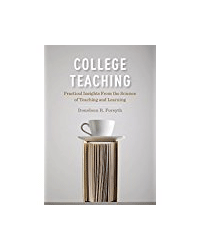“College Teaching: Practical Insights from the Science of Teaching and Learning”

“College Teaching: Practical Insights from the Science of Teaching and Learning”
By Donelson R. Forsyth
American Psychological Association
Washington, D.C., 2016
‘Compelling’ book offers no-nonsense directives, recommendations
Reviewed by James K. Luiselli, Ed.D., ABPP, BCBA-D
The author biography accompanying this book explains that Donelson R. Forsyth, a social and personality psychologist, “has taught thousands of graduate and undergraduate students during his 38 years as a professor in such courses as introductory psychology, social psychology, group dynamics, research methods, internships, theories and models of leadership, and ethics.”
His expansive expertise is on full display in this compelling book about college teaching.
Forsyth writes that his book does not assume the reader has studied psychology “or even cares about it.” Instead, his purpose is to describe practical teaching strategies and solutions to classroom challenges for both novice and veteran college instructors.
The heart of effective instruction, from Forsyth’s perspective, is that exemplary teaching requires “insight into the psychological and interpersonal factors that influence the teaching-learning process.”
He further emphasizes the need for instructors to master core competencies of their discipline, clearly organize and communicate complex information and accurately evaluate student learning.
Forsyth adopted a clever tactic in organizing his book. The chapters cover topics “in the order they gain our attention during the course of the semester.” Thus, the book begins with course planning and ends with course evaluation. In between, there are chapters about promoting student engagement, lecturing, testing, grading and managing classroom decorum, among other pertinent areas.
Two other topics represented in the book stand out because of contemporary importance within the college climate. First, Forsyth’s handling of academic integrity, civility, diversity and multiculturalism is admirable on every level. His examination of the second topic, instructional technology, is also illuminating and prescriptive.
Forsyth fully integrates the theoretical, conceptual and research bases for all of the topics he presents. However, his no-nonsense directives and recommendations stand out as the main reason to purchase the book.
They are many, well defined and easy to follow.
Clearly, the book is customized to college faculty and independent of discipline and departmental status. My quick summary of Forsyth’s message is that the best college teaching emerges when instructors pay close attention to the science of learning and dutifully evaluate the effects of empirical practices.
The scholarship of teaching and learning found in the book also extends outside of the college classroom. In this vein, “College Teaching” will assist practitioners who train, supervise and deliver didactic seminars with students, staff and interns at non-academic settings. I expect to reference the book frequently in my own teaching and training activities.
James K. Luiselli, Ed.D., ABPP, BCBA-D, is Chief Clinical Officer, Clinical Solutions, Inc. and North East Educational and Developmental Support Center, Tewksbury, Mass..
Learn more about the book: College Teaching: Practical Insights from the Science of Teaching and Learning
